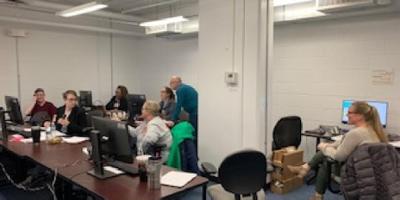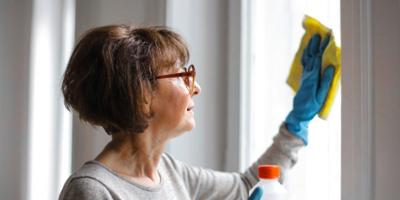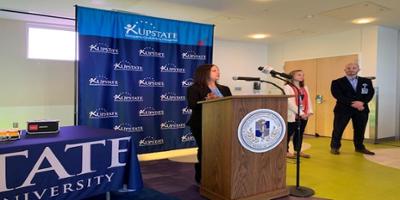New announcements to kick-off ‘Poison Prevention Month’ and remind you to “Keep Your Family Safe” from an unintentional poisoning
FOR RELEASE: March 2, 2020
SYRACUSE, N.Y. – Rochester-area 9-month-old Maisie Gillan passed away after an unintentional poisoning in January 2019. Her family wants to make sure this never happens again. Today, to kick-off Poison Prevention Month, they shared their very personal story in our new educational video you can watch here.
“This wasn’t anything part of our lives, but it has forever changed it,” said Adam Gillan, Maisie’s father, “It ended our daughter’s life. We just want people to be aware of it so that they know what to look for, they know the questions to ask, they know the things to do and for them to have the courage to have the hard conversation whether it’s with a neighbor, a family member, an elderly relative.”
Their story, sadly, happens more than we think. In 2019, the Upstate New York Poison Center managed 18,798 calls regarding children younger than six years old. Nearly half of these calls were due to unintentional exposures to medicines. We managed 44 cases of children unintentionally ingesting an opioid pain medicine. One of our goals is to do better at protecting the most vulnerable patients from unintentional poisonings to medicines especially high-risk medicines like opioids.
“Last year, pain relievers and household cleaning products were some of the top poisoning exposure cases for young children called into our poison center,” said Christine Stork, Pharm.D., DABAT, clinical director of the Upstate New York Poison Center, “We hope to raise awareness this month and all year long on how to keep your medications and other toxic products up and away and out of sight of young children.”
That is why during the month of March, celebrated as Poison Prevention Month, and during National Poison Prevention Week, March 15th – 21st, we want to help “Keep Your Family Safe” from a medication mishap.
U.S. Senator Charles Schumer said, “Simply put, there is no step too far when it comes to keeping potentially fatal drugs out of the hands of our children. That’s why I’m proud to join with the Gillan family to push for safer packaging of opioid medications and applaud Upstate NY Poison Center’s lifesaving work to boost awareness about practicing safe medicine handling. Safeguarding our children demands all of our attention.”
Remember:
- Dose matters! Always read label directions before giving or taking any medication.
- Kitchen spoons are not meant to measure medicine. Only use a medicine cup, spoon or syringe marked with proper dosing measures.
- Children will imitate! Avoid taking medication while they are watching.
- Children act fast! Put medicine away immediately after each use, preferably in a locked medicine box.
- Purses and suitcases are treasure chests to young children. Identify safe storage space for visitors bringing medicine into your home or provide them a locked med box to store their medications.
- Children who visit Emergency Departments often get into their grandparents’ medications.
- Be sure medication is safely stored when grandchildren come to visit.
- With 25% of children under 5 in daycare in the US, be sure your caregiver has the Poison Center programmed into their cell phones at 1-800-222-1222.
All of this information and much more on medication safety in one location on our website.
We are here 365 days a year, 24/7. Our 16 Certified Specialists in Poison Information are based in Upstate New York and ready to help in any poison emergency or with a medication question.
What to Expect When You Call Our Poison Center?
After careful listening, the Poison Specialist will generally tell you one of the following:
- This is not a problem, there is no need for medical care
(e.g., A child ate some silica gel crystals found in a shoe box) - The history you provided requires the patient be observed for a period of time to be sure s/he will be okay (The Certified Specialist in Poison Information will call back to check on the patient and no medical care is expected)
- Based on history provided, a trip to a physician or health care facility is necessary
(The Certified Specialist in Poison information can arrange for an emergency transport if caller agrees)
How Do We Help?
Each year our center manages more than 50,000 calls from health care providers, 911 operators, hospitals, industry, schools, and the general public in our 54-county service area. Of these calls:
- 86% are for exposures
- 35% involve children under age 5
- 14% are for information only
- 91% can be managed at home and do not require a visit to a doctor and/or a hospital
Why Centralized Service?
Poison centers save money while saving lives. Research conducted by the U.S. Department of Health and Human Services and its National Center for Disease Control concluded:
- For every $1 spent on poison centers, $33 in medical costs are saved
- The average cost to the health care system of a poisoning exposure call is $31.28, while the average cost, if other parts of the medical system are involved in a poisoning emergency, is $932
In the case of a poisoning or for information purposes, call the Upstate New York Poison Center at 1-800-222-1222. We are open 24/7, 365 days a year. Each year our center manages more than 50,000 calls from health care providers, 911 operators, hospitals, industry, schools, and the general public in our 54-county service area.
Follow us on Facebook and Twitter to stay up to date with the latest information.
About Upstate New York Poison Center
Housed inside Upstate Medical University in Syracuse, NY, the Upstate New York Poison Center is dedicated to reducing the number, cost and severity of poisonings within its designated 54-county service area as mandated by New York State Law. The Center is available 24 hours a day, 365 days a year to both health professionals and the general public at 1-800-222-1222.
About Upstate Medical University
SUNY Upstate Medical University in Syracuse, NY, is the only academic medical center in Central New York. It is also the region's largest employer with 9,460 employees. Affiliated with the State University of New York, Upstate's mission is to improve the health of the community through education, biomedical research and health care.





